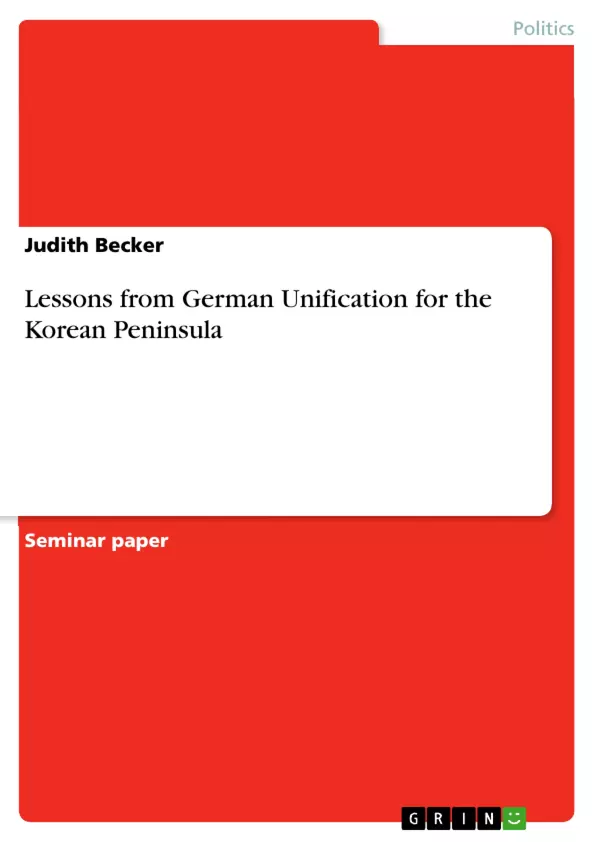Germany achieved what Korea still can achieve, namely peaceful unification. There are several similarities between the divided Koreas and the formerly divided Germanys. In both cases, the division grew out of the Second World War and the following Cold War. The divided nations have totally different systems of government. North Korea, as a communistic one-party state, is similar to the GDR and South Korea, as a democratic republic, is similar to the FDR. Major differences are apparent in the economic development between North and South Korea, which again corresponds to the situation in Germany at the end of the 1980s. In light of these similarities, an important question to answer is the following one: what lessons can the Korean Peninsula learn from German unification? Thus, this essay will proceed as follows. Firstly, the developments in Germany, leading to the opening of the Berlin Wall and the subsequent unification will be described and analyzed. Secondly, the economic and socio-cultural outcomes of the unification will be briefly analyzed. Thirdly, recommendations for the Korean Peninsula will be formulated and finally, the essay will conclude its findings.
Inhaltsverzeichnis (Table of Contents)
- Introduction
- How was German unification achieved in 1989-1990?
- Consequences of German Unification
- 'Lessons' for the Korean Peninsula based on the German Experience
Zielsetzung und Themenschwerpunkte (Objectives and Key Themes)
This essay explores the lessons that can be learned from German unification for the Korean Peninsula. It examines the process of German unification in 1989-1990, analyzing the key events and factors that led to the fall of the Berlin Wall and the subsequent reunification of the two Germanys. Furthermore, it investigates the economic and socio-cultural consequences of German unification, identifying both successes and challenges. Finally, the essay draws conclusions and proposes recommendations for the Korean Peninsula, considering its own unique context and challenges.
- The process of German unification in 1989-1990
- The economic and socio-cultural consequences of German unification
- The lessons for the Korean Peninsula based on the German experience
- The similarities between the divided Koreas and the formerly divided Germanys
- The differences in economic development between North and South Korea
Zusammenfassung der Kapitel (Chapter Summaries)
- Introduction: This chapter establishes the context for the essay by highlighting the historical division of Germany during the Cold War, focusing on the Berlin Wall and its significance. It then introduces the situation on the Korean Peninsula and its parallels with the German experience.
- How was German unification achieved in 1989-1990?: This chapter examines the events that led to the fall of the Berlin Wall and the subsequent unification of Germany, analyzing the key factors such as the economic struggles of the GDR, the growing dissatisfaction with the communist regime, and the influence of international pressures.
- Consequences of German Unification: This chapter analyzes the economic and socio-cultural outcomes of German unification, focusing on both the positive aspects, such as increased economic growth and improved living standards, and the challenges, such as social tensions and economic disparities between East and West Germany.
Schlüsselwörter (Keywords)
The primary keywords and focus topics of this essay include German unification, Korean Peninsula, Cold War, division, reunification, economic development, socio-cultural consequences, lessons learned, parallels, challenges, recommendations.
Frequently Asked Questions
What are the main similarities between the division of Germany and Korea?
Both divisions resulted from the aftermath of the Second World War and the Cold War. In both cases, the nations developed opposing systems: a democratic republic in the South/West and a communist one-party state in the North/East.
What factors led to the fall of the Berlin Wall in 1989?
Key factors included the economic struggles of the GDR, growing public dissatisfaction with the communist regime, and significant international political pressures.
What were the economic consequences of German unification?
While unification led to increased overall economic growth and improved living standards, it also created social tensions and persistent economic disparities between the former East and West Germany.
How does the economic gap between North and South Korea compare to pre-unification Germany?
The current economic disparity between North and South Korea is significantly larger than the gap between East and West Germany was in the late 1980s, presenting a unique challenge for potential Korean unification.
What can the Korean Peninsula learn from the German experience?
The German case offers insights into managing rapid political transition, the high costs of economic integration, and the importance of addressing socio-cultural differences between populations living under different systems for decades.
- Citation du texte
- MA Judith Becker (Auteur), 2008, Lessons from German Unification for the Korean Peninsula, Munich, GRIN Verlag, https://www.grin.com/document/88573



